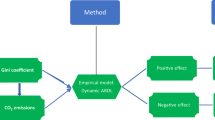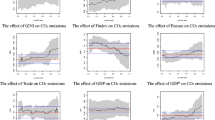Abstract
With rapid economic growth, BRICS is facing enormous burdens of carbon emission and severe issues of income inequality. However, behind this economic success, the BRICS economies also face few thoughtful challenges to improve environmental quality by catching up the sustainable development goals. Consequently, the existing empirical research is concerned with the dynamic links between income inequality and CO2 emissions by using the novel nonlinear ARDL approach, but small attention has been paid to the BRICS in literature. Therefore, we observed that a negative and positive change in income inequality has positive effect on CO2 emissions in Russia and South Africa in the long run, although a positive change in income inequality has positive effects on CO2 emissions in Brazil, Russia, and China, while a negative change in income inequality has negative effect on CO2 emissions in India, Brazil, and Russia in the short run. Hence, the findings value specific attention from policymakers in BRICS economies.
Similar content being viewed by others
References
Aslam B, Hu J, Majeed MT, Andlib Z, Ullah S (2021) Asymmetric macroeconomic determinants of CO 2 emission in China and policy approaches. Environ Sci Pollut Res:1–14
Baek J, Gweisah G (2013) Does income inequality harm the environment?: Empirical evidence from the United States. Energy Policy 62:1434–1437
Baloch MA, Khan SUD, Ulucak ZŞ, Ahmad A (2020) Analyzing the relationship between poverty, income inequality, and CO2 emission in sub-Saharan African countries. Sci Total Environ 740:139867
Berthe A, Elie L (2015) Mechanisms explaining the impact of economic inequality on environmental deterioration. Ecol Econ 116:191–200
Bowles S, Park Y (2005) Emulation, inequality, and work hours: Was Thorsten Veblen right? Econ J 115(507):F397–F412
Boyce JK (1994) Inequality as a cause of environmental degradation. Ecol Econ 11(3):169–178
Boyce JK (2003) Inequality and environmental protection, Working Paper No. 52. Political Economy Research Institute. University of Massachusetts, Amherst
Cantore N, Padilla E (2010) Equality and CO2 emissions distribution in climate change integrated assessment modelling. Energy 5(1):298–313
Cao K, Zhang W, Liu S, Huang B, Huang W (2019). Pareto law-based regional inequality analysis of PM2. 5 air pollution and economic development in China. J Environ Manage 252:109635
Chao A, Schor JB (1998) Empirical tests of status consumption: evidence from women's cosmetics. J Econ Psychol 19(1):107–131
Chen L, Xu X (2020) Effect evaluation of the long-term care insurance (LTCI) system on the health care of the elderly: a review. J Multidiscip Healthc 13:863–875. https://doi.org/10.2147/JMDH.S270454
Chen L, Zhang X, Xu X (2020) Health insurance and long-term care services for the disabled elderly in China: based on CHARLS Data. Risk Manag Healthc Policy 13:155–162. https://doi.org/10.2147/RMHP.S233949
Coondoo D, Dinda S (2008) Carbon dioxide emission and income: a temporal analysis of cross-country distributional patterns. Ecol Econ 65(2):375–385
Demir C, Cergibozan R, Gök A (2019) Income inequality and CO2 emissions: Empirical evidence from Turkey. Energy & Environment 30(3):444–461
Dhrifi A, Jaziri R, Alnahdi S (2020) Does foreign direct investment and environmental degradation matter for poverty? Evidence from developing countries. Structural Change and Economic Dynamics 52:13–21
Doğan N, Kirikkaleli D (2021) Does gender equality in education matter for environmental sustainability in sub-Saharan Africa? Environ Sci Pollut Res:1–13
Drabo A (2011) Impact of income inequality on health: does environment quality matter? Environ Plan A 43(1):146–165
Ekeocha DO (2021) Urbanization, inequality, economic development and ecological footprint: Searching for turning points and regional homogeneity in Africa. J Clean Prod 291:125244
Feng W, Lu H, Yao T, Yu Q (2020) Drought characteristics and its elevation dependence in the Qinghai–Tibet plateau during the last half-century. Sci Rep 10(1):1–11. https://doi.org/10.1038/s41598-020-71295-1
Fitzgerald JB, Jorgenson AK, Clark B (2015) Energy consumption and working hours: a longitudinal study of developed and developing nations, 1990–2008. Environ Sociol 1(3):213–223
Galor O, Moav O, Vollrath D (2004) Land inequality and the origin of divergence and overtaking in the growth process: theory and evidence. Economics Working Paper No. 2003-04, Available at SSRN: https://doi.org/10.2139/ssrn.378161
Gassebner M, Gaston N, Lamla MJ (2008) Relief for the environment? The importance of an increasingly unimportant industrial sector. Econ Inq 46(2):160–178
Golley J, Meng X (2012) Income inequality and carbon dioxide emissions: the case of Chinese urban households. Energy Econ 34(6):1864–1872
Grossman GM, Krueger AB (1995) Economic growth and the environment. Q J Econ 110(2):353–377
Heerink N, Mulatu A, Bulte E (2001) Income inequality and the environment: aggregation bias in environmental Kuznets curves. Ecol Econ 38(3):359–367
Hafeez M, Chunhui Y, Strohmaier D, Ahmed M, Jie L (2018) Does finance affect environmental degradation: evidence from One Belt and One Road Initiative region? Environ Sci Pollut Res 25(10):9579–9592
Hafeez M, Yuan C, Yuan Q, Zhuo Z, Stromaier D (2019) A global prospective of environmental degradations: economy and finance. Environ Sci Pollut Res 26(25):25898–25915
Hao Y, Chen H, Zhang Q (2016) Will income inequality affect environmental quality? Analysis based on China's provincial panel data. Ecol Indic 67:533–542
He L, Shen J, Zhang Y (2018) Ecological vulnerability assessment for ecological conservation and environmental management. J Environ Manag 206:1115–1125. https://doi.org/10.1016/j.jenvman.2017.11.059
Imran M, Khan KB, Zaman K, Musah MB, Sudiapermana E, Aziz ARA et al (2021) Achieving pro-poor growth and environmental sustainability agenda through information technologies: as right as rain. Environ Sci Pollut Res:1–16
Ivins C (2013) Inequality matters: BRICS inequalities fact sheet. BRICS Policy Center, Rio de Janeiro
Jin G, Fu R, Li Z, Wu F, Zhang F (2018) CO2 emissions and poverty alleviation in China: an empirical study based on municipal panel data. J Clean Prod 202:883–891
Jorgenson A, Schor J, Huang X (2017) Income inequality and carbon emissions in the United States: a state-level analysis, 1997–2012. Ecol Econ 134:40–48
Kasuga H, Takaya M (2017) Does inequality affect environmental quality? Evidence from major Japanese cities. J Clean Prod 142:3689–3701
Khan M (2019) Does macroeconomic instability cause environmental pollution? The case of Pakistan economy. Environ Sci Pollut Res 26(14):14649–14659
Li Y, Peng H, Hafeez M, Ahmad H (2020) Assessment of energy disparity and financial development nexus in environmental Kuznets curve framework. In: International Conference on Management Science and Engineering Management. Springer, Cham, pp 613–626
Li X, Yu Z, Salman A, Ali Q, Hafeez M, Aslam MS (2021a) The role of financial development indicators in sustainable development-environmental degradation nexus. Environ Sci Pollut Res:1–12
Li Y, Wang S, Xu T, Li J, Zhang Y, Xu T, Yang J (2021b) Novel designs for the reliability and safety of supercritical water oxidation process for sludge treatment. Process Saf Environ Prot 149:385–398
Liu J, Liu Y, Wang X (2019) An environmental assessment model of construction and demolition waste based on system dynamics: a case study in Guangzhou. Environ Sci Pollut Res Int 27:37237–37259. https://doi.org/10.1007/s11356-019-07107-5
Lynch J, Smith GD, Harper SA, Hillemeier M, Ross N, Kaplan GA, Wolfson M (2004) Is income inequality a determinant of population health? Part 1. A systematic review. Milbank Q 82(1):5–99
Magnani E (2000) The Environmental Kuznets Curve, environmental protection policy and income distribution. Ecol Econ 32(3):431–443
Mahalik MK, Mallick H, Padhan H, Sahoo B (2018) Is skewed income distribution good for environmental quality? A comparative analysis among selected BRICS countries. Environ Sci Pollut Res 25(23):23170–23194
Mallick H, Padhan H, Mahalik MK (2019) Does skewed pattern of income distribution matter for the environmental quality? Evidence from selected BRICS economies with an application of Quantile-on-Quantile regression (QQR) approach. Energy Policy 129:120–131
Nicole W (2014) Cooking up indoor air pollution: Emissions from natural gas stoves. Environ Health Perspec 122(1):A27
Pesaran MH, Shin Y, Smith RJ (2001) Bounds testing approaches to the analysis of level relationships. J Appl Econ 16(3):289–326
Ravallion M, Heil M, Jalan J (2000) Carbon emissions and income inequalityOxf. Econ Pap 52(4):651–669
Rojas-Vallejos J, Lastuka A (2020) The income inequality and carbon emissions trade-off revisited. Energy Policy 139:111302
Sehrawat M (2020) Modelling the nexus between human capital, income inequality, and energy demand in India: new evidences from asymmetric and non-linear analysis. Environ Sci Pollut Res 28(3):3632–3643
Shin Y, Yu B, Greenwood-Nimmo M (2014) Modelling asymmetric cointegration and dynamic multipliers in a nonlinear ARDL framework. In: Festschrift in honor of Peter Schmidt. Springer, New York, pp 281–314
Torras M, Boyce JK (1998) Income, inequality, and pollution: a reassessment of the environmental Kuznets curve. Ecol Econ 25(2):147–160
Uddin MM, Mishra V, Smyth R (2020) Income inequality and CO2 emissions in the G7, 1870–2014: Evidence from non-parametric modelling. Energy Econ 88:104780
Ullah S, Ozturk I, Sohail S (2021) The asymmetric effects of fiscal and monetary policy instruments on Pakistan’s environmental pollution. Environ Sci Pollut Res 28(6):7450–7461
Usman A, Ullah S, Ozturk I, Chishti MZ, Zafar SM (2020) Analysis of asymmetries in the nexus among clean energy and environmental quality in Pakistan. Environ Sci Pollut Res 27(17):20736–20747
Wu R, Xie Z (2020) Identifying the impacts of income inequality on CO2 emissions: empirical evidences from OECD countries and non-OECD countries. J Clean Prod 277:123858
Xu X, Chen L (2019) Projection of long-term care costs in China, 2020–2050, based on the Bayesian quantile regression method. Sustainability 11(13):3530. https://doi.org/10.3390/su11133530
Yang S, Li Z, Yan K, Zhang X, Xu Z, Liu W, Liu Z, Liu H (2021) Removing and recycling mercury from scrubbing solution produced in wet nonferrous metal smelting flue gas purification process. J Environ Sci (China) 103:59–68. https://doi.org/10.1016/j.jes.2020.10.013
Yuan H, Wang Z, Shi Y, Hao J (2021) A dissipative structure theory-based investigation of a construction and demolition waste minimization system in China. https://doi.org/10.1080/09640568.2021.1889484
Zhang J, Zhang Y (2021) The relationship between China’s income inequality and transport infrastructure, economic growth, and carbon emissions. Growth Chang 52(1):243–264
Zhang C, Zhao W (2014) Panel estimation for income inequality and CO2 emissions: a regional analysis in China. Appl Energy 136:382–392
Zhu H, Xia H, Guo Y, Peng C (2018) The heterogeneous effects of urbanization and income inequality on CO 2 emissions in BRICS economies: evidence from panel quantile regression. Environ Sci Pollut Res 25(17):17176–17193
World Bank (2020) World Development Indicators. World Bank, Washington DC
Availability of data and materials
The datasets used and/or analyzed during the current study are available from the corresponding author on reasonable request.
Author information
Authors and Affiliations
Contributions
This idea was given by Weijun Zhao. Muhammad Hafeez, Sana Ullah, and Adnan Maqbool analyzed the data and wrote the complete paper. Sidra Sohail read and approved the final version.
Corresponding authors
Ethics declarations
Ethical approval
Not applicable
Consent to participate
I am free to contact any of the people involved in the research to seek further clarification and information
Consent to publish
Not applicable
Competing interests
The authors declare no competing interests.
Additional information
Responsible Editor: Nicholas Apergis
Publisher’s note
Springer Nature remains neutral with regard to jurisdictional claims in published maps and institutional affiliations.
Rights and permissions
About this article
Cite this article
Zhao, W., Hafeez, M., Maqbool, A. et al. Analysis of income inequality and environmental pollution in BRICS using fresh asymmetric approach. Environ Sci Pollut Res 28, 51199–51209 (2021). https://doi.org/10.1007/s11356-021-14209-6
Received:
Accepted:
Published:
Issue Date:
DOI: https://doi.org/10.1007/s11356-021-14209-6




